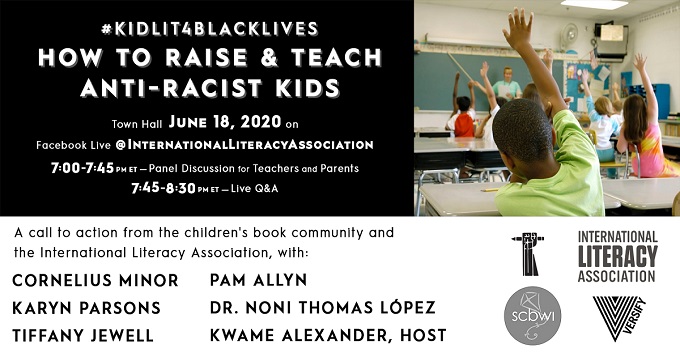 The International Literacy Association (ILA), in partnership with Kwame Alexander, award-winning children’s book author and founding editor of Houghton Mifflin Harcourt imprint Versify, announced today “How to Raise and Teach Anti-Racist Kids,” a Facebook Live event starting at 7:00 p.m. ET this Thursday, June 18.
The International Literacy Association (ILA), in partnership with Kwame Alexander, award-winning children’s book author and founding editor of Houghton Mifflin Harcourt imprint Versify, announced today “How to Raise and Teach Anti-Racist Kids,” a Facebook Live event starting at 7:00 p.m. ET this Thursday, June 18.
The free event is a follow-up to June 4’s overwhelmingly successful KidLit Rally for Black Lives, hosted by advocacy group The Brown Bookshelf. Alexander, a frequent ILA conference keynoter, organized the rally with fellow authors Jacqueline Woodson and Jason Reynolds in less than 48 hours—a “roll of thunder” call to action in response to the killing of George Floyd in late May.
“Teachers and parents must educate and empower students to imagine a better world,” said Alexander. “For that to happen in the classroom and at home, they’ve got to be better prepared. The rally, this town hall, are all small efforts to get them ready for this paramount work.”
“How to Raise and Teach Anti-Racist Kids” is a perfect example of “the work we [at ILA] should be doing,” said ILA Vice President of the Board Dr. Stephen G. Peters, who will deliver opening remarks.
“ILA is an anti-racist organization that stands for justice and equality,” Peters asserted in a joint statement issued by ILA leadership earlier this month.
The first half of Thursday’s event will be a panel discussion moderated by Alexander, followed by a 45-minute Q&A. Panelists include educators Cornelius Minor, author of We Got This: Equity, Access, and the Quest to Be Who Our Students Need Us to Be; Tiffany M. Jewell, author of This Book is Anti-Racist; Pam Allyn, global literacy expert and coauthor (with Dr. Ernest Morrell) of Every Child a Super Reader; and Dr. Noni Thomas López, head of school at The Gordon School in Providence, R.I., in addition to Karyn Parsons, author and founder of Sweet Blackberry, a nonprofit with a mission “to bring little known stories of African American achievement to children everywhere.”
Parsons is best known for playing Hilary Banks on the 1990s NBC sitcom “The Fresh Prince of Bel-Air,” but hers is just one familiar face: Minor is a longtime ILA collaborator and an important figure in the organization’s social justice work.
At the ILA 2016 Conference, which took place in Boston, MA, literally days after police shootings claimed the lives of Alton Sterling and Philando Castile, Minor facilitated an on-the-fly session modeling how teachers could talk about emotionally charged and controversial issues in the classroom.
The following year, Minor delivered powerful remarks at ILA’s inaugural equity panel—inspired by his session at ILA 2016—which also featured Pulitzer Prize winner Nikole Hannah-Jones.
Thursday’s event marks an important next step in the #ILAequity movement, said Peters. He added, “This is just the beginning of much more to come.”
WHAT: How to Raise and Teach Anti-Racist Kids
WHEN: Thursday, June 18, 7:00 p.m.–8:30 p.m. ET
WHERE: https://www.facebook.com/InternationalLiteracyAssociation/
HASHTAGS: #KidLit4BlackLives; #ILAequity
The live event will have an ASL interpreter, available through the support of the Society of Children’s Book Writers and Illustrators. Closed captioning will be available on the archived recording.